'Neo-Fundamentalist' / 'Post-Modernist' Controversy in the PCA
Is "Fundamentalism" a danger to the PCA? Or is lack of charity the true danger?
In the 1920-1930s, the Fundamentalist-Modernist Controversy came to a head in the northern Presbyterian Church with renowned scholar and Princeton professor J. Gresham Machen at the center.
Machen held faithfully to the historic doctrines of the Reformed Faith as summarized in the Westminster Standards (the Confession and Catechisms) against the Modernists and Liberals who wished to accommodate the culture and the scientific age in hopes of remaining relevant.
Machen insisted no accommodation or broadening was necessary. In all his pleading for confessional integrity, Machen was criticized by his opponents as ‘temperamentally deficient.’
Now a century later, some have attempted to portray the current upheaval in the Presbyterian Church in America (PCA) as a continuation of the Fundamentalist-Modernist Controversy:
In his recent essay published on the Semper Ref1 Collaborative, TE Derek Radney articulates the great danger to the future of the PCA is in the form of those whom he denounces as “Reformed Fundamentalists.”
I. The Neo(?) Reformed(?) Fundamentalists
Radney is not the first to label his PCA brothers as fundamentalists. In an oddly titled recent article - apparently alluding to the speech of renowned 20th Century Liberal Henry Emerson Fosdick: Shall the Fundamentalists Win - TE David Cassidy insists that (what he calls) “Neo-Fundamentalism” must have no place in the PCA.
To label one’s PCA opponents as “fundamentalists” is an odd choice at best, especially considering the rejection of Fundamentalism by those within Reformed Christianity.2 Machen, after all, not only refused to identify himself as a Fundamentalist Christian, but also corrected those who attempted to label him as a Fundamentalist.
Radney, however, readily acknowledges he is not using Fundamentalism as it is normally understood:
“Fundamentalism” in the non-technical, non-historical, theological sense conjures up caricatures of radical religious fundamentalism, terrorism, AK-47s, etc. on the one hand and jean jumpers and teetotaling on the other.
While he denies any pejorative connotation in his use of the word, he does insist he uses the word negatively. It is hard to see how one could ascribe this term - except in its historical, theological, and technical sense - to describe one’s brothers and have it come across as anything other than a pejorative.
II. Effective Rhetoric
While inaccurate in terms of history and theology, labeling the brothers with whom one disagrees as “Fundamentalists” is nonetheless an effective rhetorical device. It makes it much easier to dismiss and marginalize their ideas rather than interact with them.
We have seen this tactic employed in the wider culture with the expression “White Supremacist.” In former times, a White Supremacist was a member of a secret society prancing around at night in a bedsheet and dunce cap playing with matches and doing all sorts of wicked things. But now - according to the cultural elite - a “White Supremacist” is anyone who does not jump on the bandwagon of Critical Race Theory (CRT).
By this tactic, CRT practitioners need not make a logical argument; they can simply marginalize and silence anyone skeptical of their position for fear of being denounced, doxxed, and cancelled for their allegedly “White Supremacist” views.
It seems as though some in the PCA have adopted this method with the word “Fundamentalist.”
For example, one PCA pastor and National Partnership member received pushback after - on social media - encouraging Christians to “curse” God in a since deleted posy.3 Instead of seriously engaging with his critics he simply dismissed them as “fundamentalists:”
Rather than interact and persuade brothers to their point of view, some in the PCA simply label their would-be interlocutors as “Fundamentalists” and brush them off. TE David Strain notes this tendency in a recent article:
If differing with would-be luminaries such as Radney, Cassidy, et al. on certain points of subscription, sanctification, sexuality, the Sabbath, etc. makes one a “Fundamentalist!!” then who would want to hold such “Fundamentalist!!” positions?
But it is important to consider whether Radney and Cassidy accurately characterize their opponents. Or do they simply caricature them? The tendency to label one’s opponents in a way in which they would not agree is exactly the sort of thing TE Timothy J. Keller warned about recently:

III. The Post(?) Modernists in the PCA
If the brothers about whom Radney and Cassidy warn us are the heirs of the Fundamentalist side in the Old Controversy, then do Radney and Cassidy represent the Modernists? Should we consider the current controversy one of (Neo)/(Reformed) Fundamentalists and (Post) Modernists? Their choice of language seems to invite such nomenclature.
I would prefer not to be called a “Neo-Reformed-Fundamentalist” But given the choice between identifying with the Fundamentalists or the Modernists, I’ll take my stand joyfully with the former. It is hard to believe anyone in the PCA would side with the Modernists, but they, and not I, have chosen the language in their articles.4
The tactics of the the (Post?) Modernist side in this controversy seem to mirror that of the Modernists of old. Whereas Machen was accused of being temperamentally defective, his so-called “warrior children” are accused of being unable to play nicely with those with whom they disagree:
Radney accuses his brothers, the so-called “Reformed Fundamentalists,” of being driven by “relational anxiety.” He goes on to psycho-analyze a wide swath of the PCA and dismiss them as lacking humility, being driven by “radical suspicion,” and even a lack of self-awareness:
IV. Labels, Charity, and the PCA
The host of the most influential podcast in the PCA, RE Brad Isbell, is quick to remind us “there are no theological liberals in the PCA.” It has become something of a slogan, but is an important reminder: the controversy in the PCA does not involve theological liberals who reject the truth of the Scripture, but our brethren in Christ.
Not that long ago the three “camps” in the PCA got along reasonably well and generally referred to one another in terms with which they could all mutually agree (or mutually dislike together!). Whether it was TE Bryan Chapell’s “traditionalists, progressives, and neutrals,”5 “confessionalists, pietists, and culturalists,”6 or something else, there was generally an attempt not to describe the other camp in an inflammatory way.
But that seems to have changed this year. Those on the more “progressive” or “culturalist” wing of the PCA not only pejoratively (or “negatively”) label the brethren, but also presume to know the motives and anxieties of their brothers.
Instead of simply labeling (“Fundamentalist”!!) and presuming to psycho-analyze (“relational anxiety”) the brethren, it is a far more effective witness and far more charitable to instead interact - in good faith - with the principles and values of the brethren.
Until all sides can deal with one another with openness, integrity, charity, and truth, it is difficult to see how the PCA can have either purity or peace.
The “Editorial Team” of Semper Ref consists of TEs Travis Scott, Justin Woodall, Ben Jolliffe, and Dr. Tim LeCroy, PhD. Three of the four members of the editorial board are listed as members of the formerly secret organization, the National Partnership.
Although in a sense there is a “Fundamentalist” lineage within the PCA via Covenant Theological Seminary. But those whom Radney and Cassidy label as “Fundamentalists” are not especially connected to the Saint Louis school.
The use of the word Fundamentalist - divorced from its historical, theological, and technical meaning - does, however, suggest a friendliness with a Post-Modern view of language in which the meaning of words is not semantically self-contained, but driven by the author’s feelings more than anything else.
I have heard recently that some in the camp that Chapell in 2015 labeled “progressive” do not like that term. I am not fond of his nomenclature either. But ByFaith uses it, so it must be acceptable.
yeah, yeah, yeah, “BUT WE’RE ALL CONFESSIONALISTS!” Okay. And since round is shape, I am in shape….


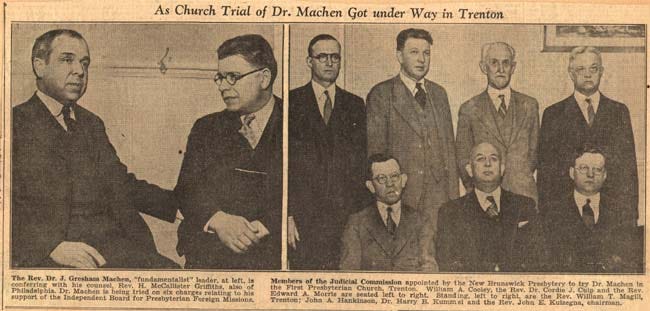
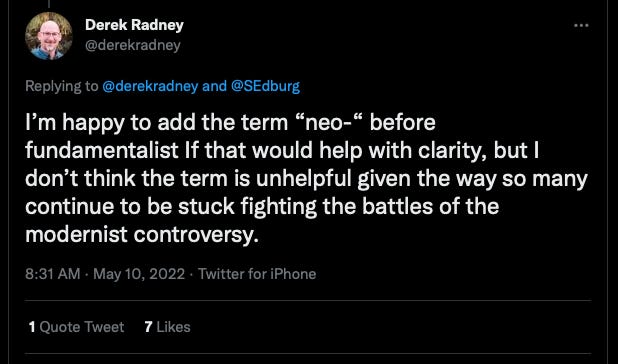
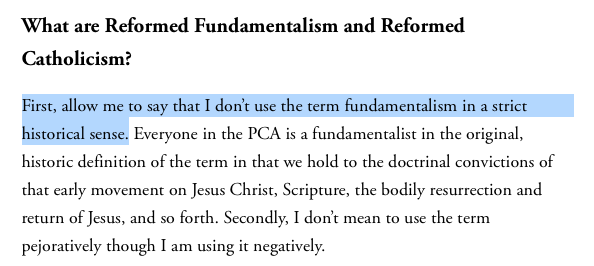
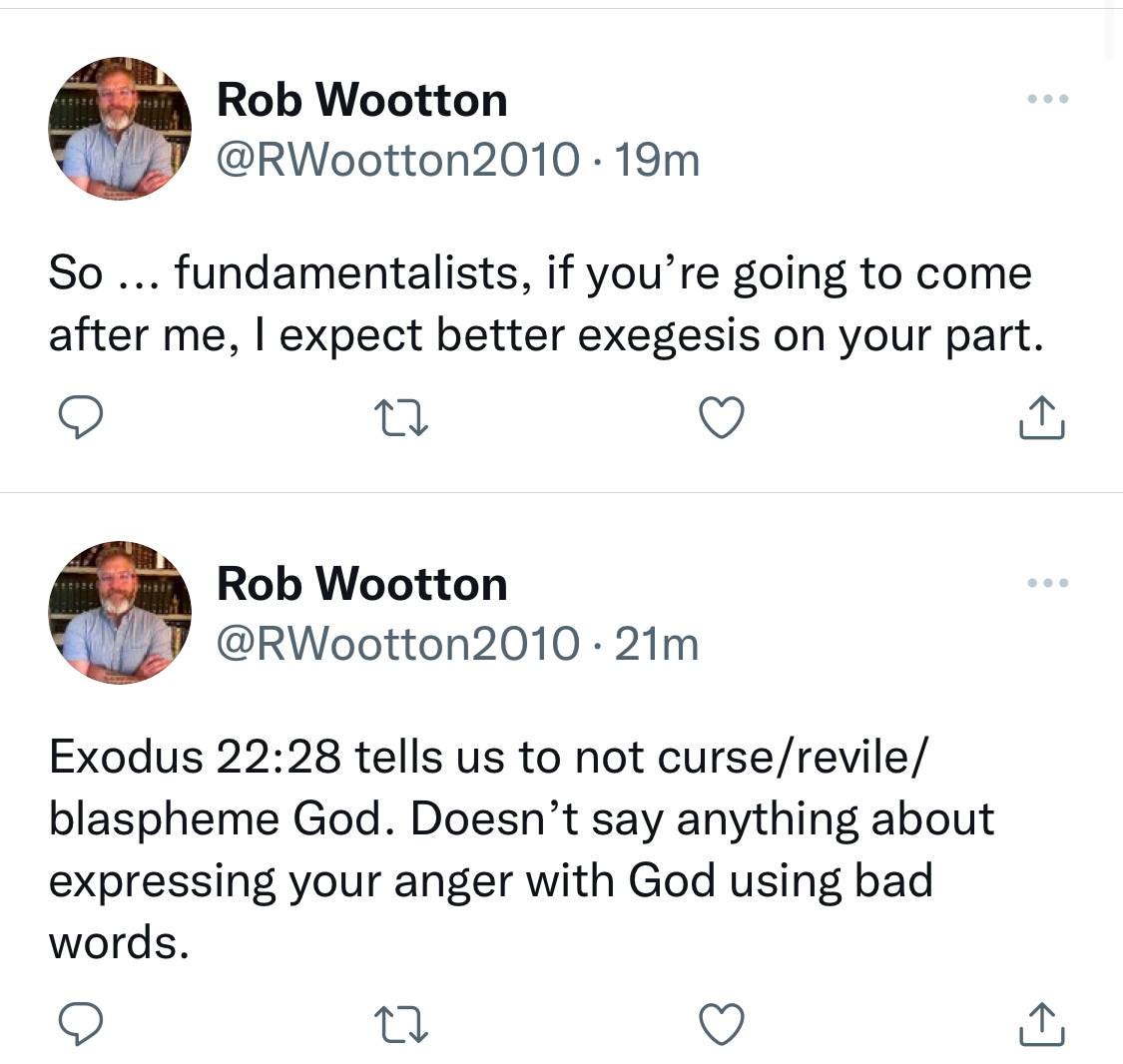


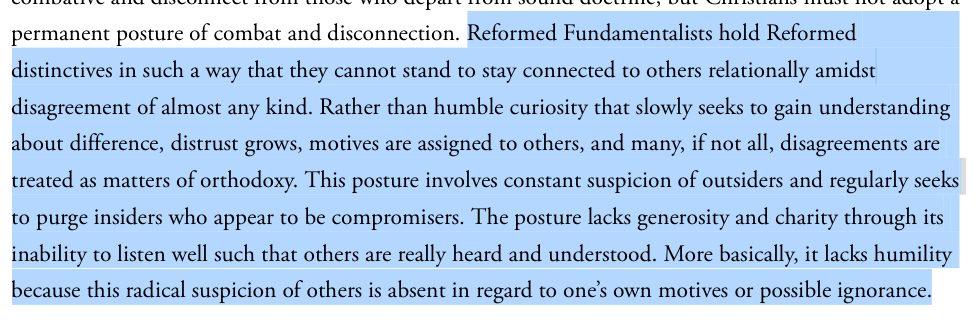
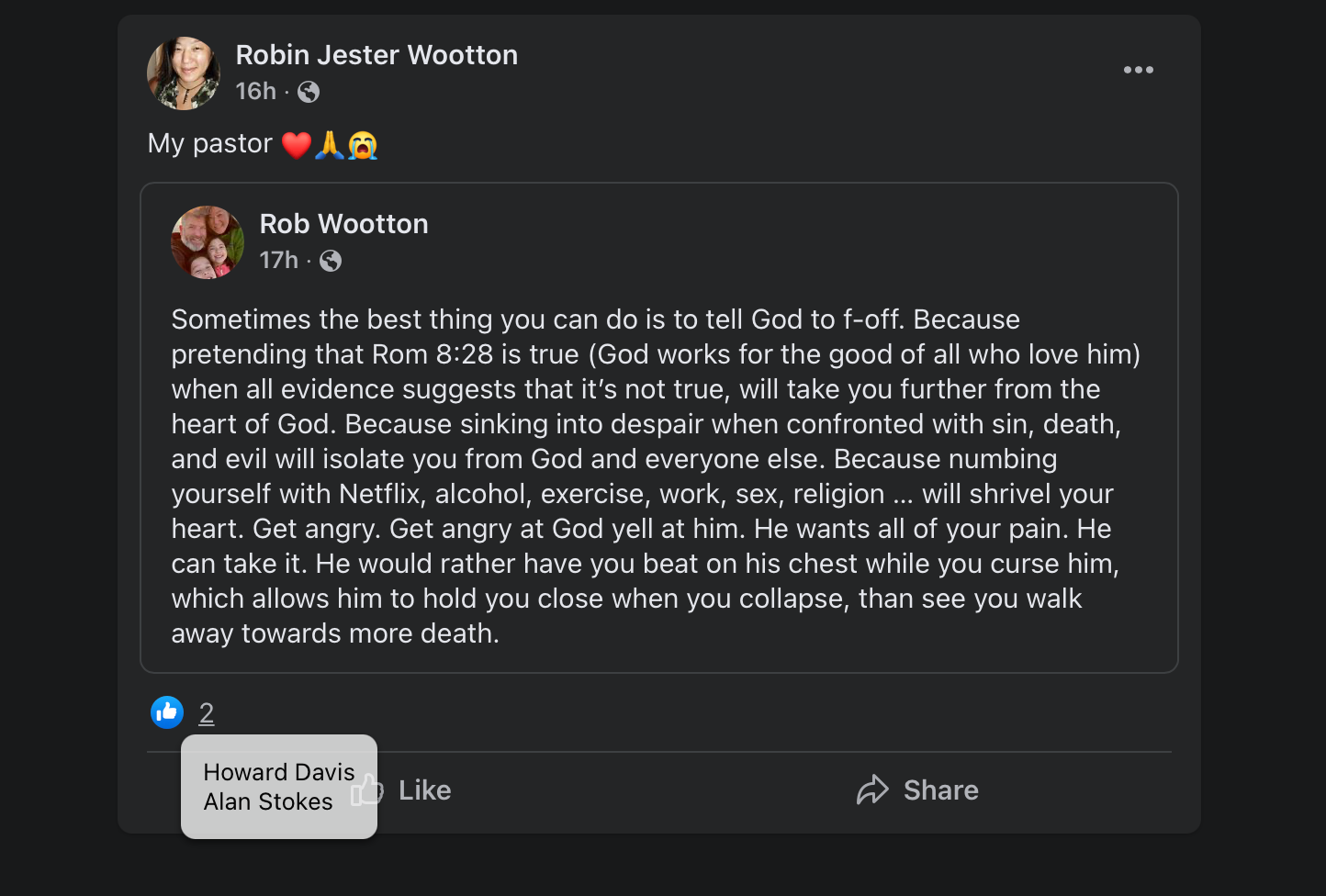
The reality is that the civility of the GRN has come to a head. Instead of trying to
‘get along’ with their brothers they need to call out the truth and demand adherence to the standards of the PCA. Those who are unwilling or unable need to go; not those who are toeing the line.